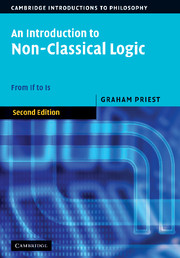Book contents
- Frontmatter
- Contents
- Preface to the First Edition
- Preface to the Second Edition
- Mathematical Prolegomenon
- Part I Propositional Logic
- 1 Classical Logic and the Material Conditional
- 2 Basic Modal Logic
- 3 Normal Modal Logics
- 4 Non-normal Modal Logics; Strict Conditionals
- 5 Conditional Logics
- 6 Intuitionist Logic
- 7 Many-valued Logics
- 8 First Degree Entailment
- 9 Logics with Gaps, Gluts and Worlds
- 10 Relevant Logics
- 11 Fuzzy Logics
- 11a Appendix: Many-valued Modal Logics
- Postscript: An Historical Perspective on Conditionals
- Part II Quantification and Identity
- Postscript: A Methodological Coda
- References
- Index of Names
- Index of Subjects
Postscript: An Historical Perspective on Conditionals
Published online by Cambridge University Press: 05 June 2012
- Frontmatter
- Contents
- Preface to the First Edition
- Preface to the Second Edition
- Mathematical Prolegomenon
- Part I Propositional Logic
- 1 Classical Logic and the Material Conditional
- 2 Basic Modal Logic
- 3 Normal Modal Logics
- 4 Non-normal Modal Logics; Strict Conditionals
- 5 Conditional Logics
- 6 Intuitionist Logic
- 7 Many-valued Logics
- 8 First Degree Entailment
- 9 Logics with Gaps, Gluts and Worlds
- 10 Relevant Logics
- 11 Fuzzy Logics
- 11a Appendix: Many-valued Modal Logics
- Postscript: An Historical Perspective on Conditionals
- Part II Quantification and Identity
- Postscript: A Methodological Coda
- References
- Index of Names
- Index of Subjects
Summary
Part I of the book has explored, in various ways, a relevant account of conditionals. Such an account seems to me to be better than any of the other accounts that we have traversed in the course of Part I. This is, naturally, a contentious view. Logic is a contentious subject, and the conditional has been particularly so since the earliest years of the discipline. It was the Stoic logicians who first discussed conditionals explicitly, and they had at least four competing accounts. These accounts survived – one way or another – and others were added throughout the Middle Ages. Consensus might have been reached locally, but only locally.
The changes in logic at the beginning of the twentieth century were revolutionary. The power of the mathematical techniques employed by the founders of modern logic made anything before obsolete. (Which is not to say that there is not now a good deal to be learned from it – just that whatever is of value in it must be seen through radically new eyes.) It is perhaps not surprising, then, that their work established a very general consensus over the conditional. The view of the conditional as material became highly orthodox – though never universal, as C. I. Lewis bears witness.
Digesting the results of the revolution occupied logicians in the first half of the century. But the second half was quite different.
Information
- Type
- Chapter
- Information
- An Introduction to Non-Classical LogicFrom If to Is, pp. 259 - 260Publisher: Cambridge University PressPrint publication year: 2008
